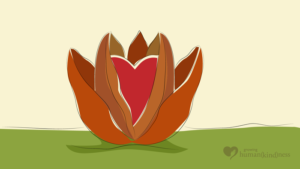20th century psychologist Carl Rogers is most widely known for his ideas about self acceptance – how this particular form of compassion is the cradle of change: “The curious paradox is that when I accept myself just as I am, then I can change.”
I often think of Carl Rogers and Fred Rogers, the host and writer of Mr. Rogers’ Neighborhood, as the two Rogers, those who offer us a well of understanding and curiosity for the task of being human.
There’s another Carl Rogers quote that I find particularly beautiful and inspiring, from his book A Way of Being:
Whether we are speaking of a flower or an oak tree, of an earthworm or a beautiful bird, of an ape or a person, we will do well, I believe, to recognize that life is an active process, not a passive one. Whether the stimulus arises from within or without, whether the environment is favorable or unfavorable, the behaviors of an organism can be counted on to be in the direction of maintaining, enhancing, and reproducing itself. This is the very nature of the process we call life. This tendency is operative at all times.
….I remember that in my boyhood, the bin in which we stored our winter’s supply of potatoes was in the basement, several feet below a small window. The conditions were unfavorable, but the potatoes would begin to sprout—pale white sprouts, so unlike the healthy green shoots they sent up when planted in the soil in the spring. But these sad, spindly sprouts would grow 2 or 3 feet in length as they reached toward the distant light of the window. The sprouts were, in their bizarre, futile growth, a sort of desperate expression of the directional tendency I have been describing. They would never become plants, never mature, never fulfill their real potential. But under the most adverse circumstances, they were striving to become. Life would not give up, even if it could not flourish. In dealing with clients whose lives have been terribly warped, in working with men and women on the back wards of state hospitals, I often think of those potato sprouts. So unfavorable have been the conditions in which these people have developed that their lives often seem abnormal, twisted, scarcely human. Yet, the directional tendency in them can be trusted. The clue to understanding their behavior is that they are striving, in the only ways that they perceive as available to them, to move toward growth, toward becoming. To healthy persons, the results may seem bizarre and futile, but they are life’s desperate attempt to become itself.”
The image of the potatoes makes me cry. It is so beautiful and tender and brave, all at once.
As many gardeners, botanists and ecologists know, seeds can lie dormant for hundreds – or thousands of years – patiently waiting for the ripe and right conditions to sprout and unfurl.
And like the sprouting potatoes, there is something in us that is looking for the light, that longs to become and unfold.
I find it helpful to tuck these reminders into our pockets, to hold these images in our minds and in our hearts.
So often, when we’re caring for the residue of trauma, or when we’re in situations of adverse soil or sun or moisture, we can feel like healing can never come, or that our seeds will never sprout.
We can criticize ourselves for our lack of progress or movement, or for our seemingly stunted development.
But as my teacher Bonnie Badenoch says, “all behavior is adaptive.” What can look abnormal or even negative in its own way can be a way that our bodies, nervous systems, hearts and minds have been working on our behalf, caring for us in the best way they’ve known how.
I think of my other beloved teacher, Dr. Gordon Neufeld, and how he would say, “the brain has its reasons” when describing the ways our defenses and protective measures can rise up to care for our well being.
There is much about life that can be hard. We can find ourselves in rocky, stony and unforgiving soil.
It’s my hope, that in whatever ways you’ve coped for life’s stress, hardship and pain, that you can see the shoots and sprouts of your own being, the part of you that keeps reaching – in whatever small or large way it can – towards the light.

